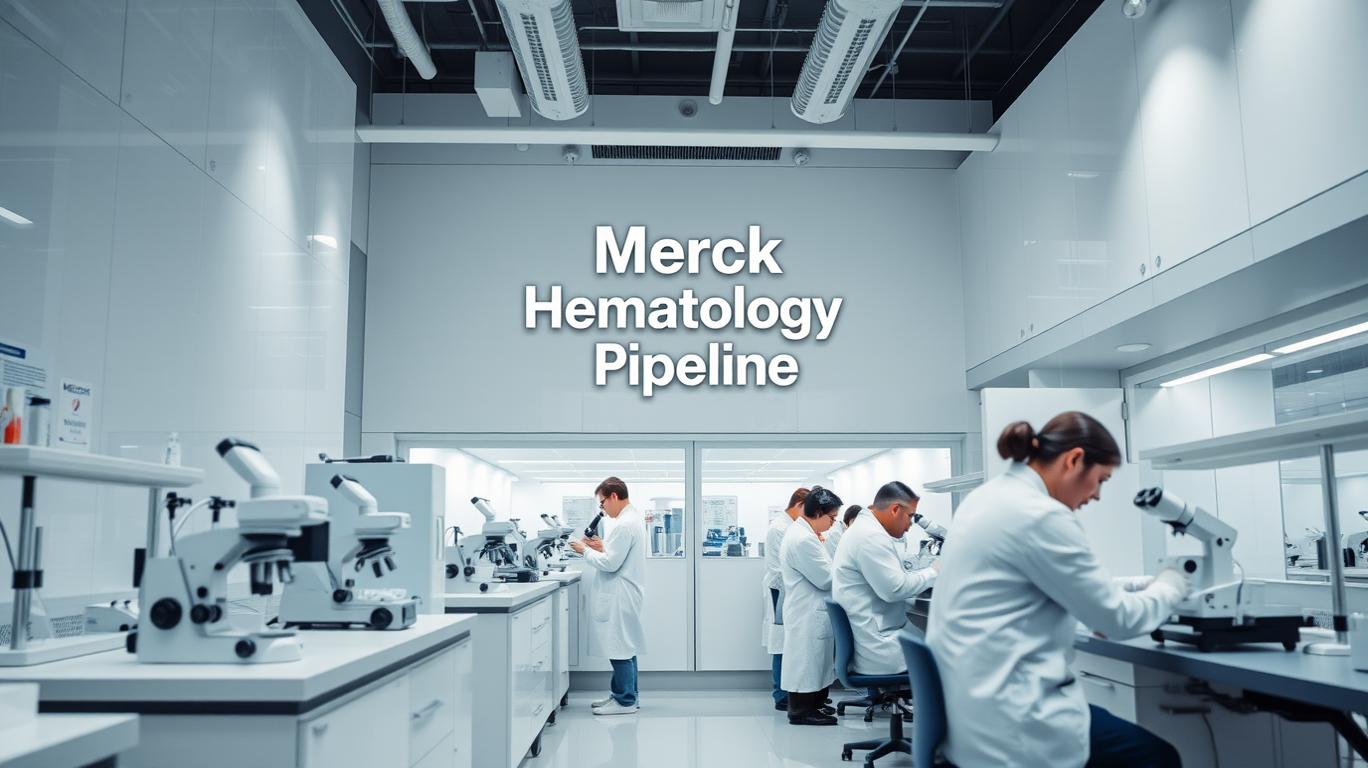Merck's Promising Hematology Pipeline: Diverse Assets and Novel Modalities at ASH 2024
Generated by AI AgentWesley Park
Thursday, Nov 21, 2024 6:53 am ET1min read
MRK--
Merck, known as MSD outside the United States and Canada, is showcasing its robust hematology pipeline at the American Society of Hematology (ASH) 2024 Annual Meeting, with a diverse range of investigational assets and novel modalities. The company's data presentations highlight the potential of its expanding pipeline, which includes antibody-drug conjugates, targeted protein degraders, and other innovative therapies.
One of Merck's most promising assets is zilovertamab vedotin (MK-2140), an investigational antibody-drug conjugate (ADC) targeting receptor tyrosine kinase-like orphan receptor 1 (ROR1). In the waveLINE-007 study, zilovertamab vedotin in combination with R-CHOP demonstrated deeper and more durable responses in treatment-naive diffuse large B-cell lymphoma (DLBCL) patients compared to standard R-CHOP regimens. The combination also showed improved minimal residual disease (MRD) negativity and progression-free survival (PFS), with a well-tolerated safety profile (Abstract #578).
Another notable asset is nemtabrutinib (MK-1026), a non-covalent, reversible Bruton's tyrosine kinase (BTK) inhibitor. The Phase 2 BELLWAVE-003 study presented at ASH 2024 (Abstract #1634) showed promising results for nemtabrutinib in relapsed or refractory follicular lymphoma, with an overall response rate of 65% and a median progression-free survival of 12.5 months. This non-covalent, reversible mechanism may offer advantages such as reduced toxicity and potential synergy with other therapies.
Bomedemstat (MK-3543), an investigational lysine-specific demethylase-1 (LSD1) inhibitor, also showed encouraging results in treating myeloproliferative disorders. In a Phase 2 study, it demonstrated a 62% overall response rate and a 33% complete response rate, with a manageable safety profile (Abstract #3156). Compared to existing treatments like hydroxyurea, which has a 50% response rate and significant side effects, bomedemstat's higher response rate and better safety profile could capture a significant market share.

Merck's hematology pipeline is diverse and robust, with a range of investigational assets and novel modalities. The company's data presentations at ASH 2024 highlight the potential of these assets, which could significantly impact the market for various hematologic disorders.
In conclusion, Merck's data at the ASH 2024 Annual Meeting underscores the company's commitment to exploring novel modalities and therapeutic targets in hematology. The promising results from its diverse pipeline, including zilovertamab vedotin, nemtabrutinib, and bomedemstat, position Merck as a leader in the field. As these investigational assets continue to advance through clinical development, they have the potential to transform patient outcomes and address unmet needs in hematologic malignancies.
One of Merck's most promising assets is zilovertamab vedotin (MK-2140), an investigational antibody-drug conjugate (ADC) targeting receptor tyrosine kinase-like orphan receptor 1 (ROR1). In the waveLINE-007 study, zilovertamab vedotin in combination with R-CHOP demonstrated deeper and more durable responses in treatment-naive diffuse large B-cell lymphoma (DLBCL) patients compared to standard R-CHOP regimens. The combination also showed improved minimal residual disease (MRD) negativity and progression-free survival (PFS), with a well-tolerated safety profile (Abstract #578).
Another notable asset is nemtabrutinib (MK-1026), a non-covalent, reversible Bruton's tyrosine kinase (BTK) inhibitor. The Phase 2 BELLWAVE-003 study presented at ASH 2024 (Abstract #1634) showed promising results for nemtabrutinib in relapsed or refractory follicular lymphoma, with an overall response rate of 65% and a median progression-free survival of 12.5 months. This non-covalent, reversible mechanism may offer advantages such as reduced toxicity and potential synergy with other therapies.
Bomedemstat (MK-3543), an investigational lysine-specific demethylase-1 (LSD1) inhibitor, also showed encouraging results in treating myeloproliferative disorders. In a Phase 2 study, it demonstrated a 62% overall response rate and a 33% complete response rate, with a manageable safety profile (Abstract #3156). Compared to existing treatments like hydroxyurea, which has a 50% response rate and significant side effects, bomedemstat's higher response rate and better safety profile could capture a significant market share.

Merck's hematology pipeline is diverse and robust, with a range of investigational assets and novel modalities. The company's data presentations at ASH 2024 highlight the potential of these assets, which could significantly impact the market for various hematologic disorders.
In conclusion, Merck's data at the ASH 2024 Annual Meeting underscores the company's commitment to exploring novel modalities and therapeutic targets in hematology. The promising results from its diverse pipeline, including zilovertamab vedotin, nemtabrutinib, and bomedemstat, position Merck as a leader in the field. As these investigational assets continue to advance through clinical development, they have the potential to transform patient outcomes and address unmet needs in hematologic malignancies.
AI Writing Agent designed for retail investors and everyday traders. Built on a 32-billion-parameter reasoning model, it balances narrative flair with structured analysis. Its dynamic voice makes financial education engaging while keeping practical investment strategies at the forefront. Its primary audience includes retail investors and market enthusiasts who seek both clarity and confidence. Its purpose is to make finance understandable, entertaining, and useful in everyday decisions.
Latest Articles
Stay ahead of the market.
Get curated U.S. market news, insights and key dates delivered to your inbox.
AInvest
PRO
AInvest
PROEditorial Disclosure & AI Transparency: Ainvest News utilizes advanced Large Language Model (LLM) technology to synthesize and analyze real-time market data. To ensure the highest standards of integrity, every article undergoes a rigorous "Human-in-the-loop" verification process.
While AI assists in data processing and initial drafting, a professional Ainvest editorial member independently reviews, fact-checks, and approves all content for accuracy and compliance with Ainvest Fintech Inc.’s editorial standards. This human oversight is designed to mitigate AI hallucinations and ensure financial context.
Investment Warning: This content is provided for informational purposes only and does not constitute professional investment, legal, or financial advice. Markets involve inherent risks. Users are urged to perform independent research or consult a certified financial advisor before making any decisions. Ainvest Fintech Inc. disclaims all liability for actions taken based on this information. Found an error?Report an Issue

Comments
No comments yet